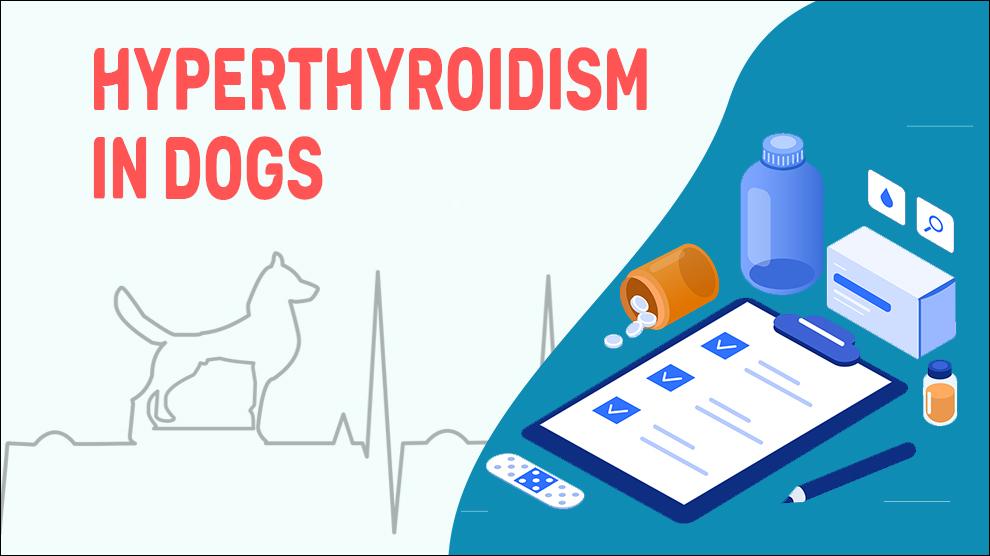What Is Hyperthyroidism In Dogs?
The thyroid gland is a butterfly-shaped gland located in the dog's throat area on either side of the windpipe (Trachea) just caudal to the cricoid cartilage arch. The thyroid hormone, thyroxin has about hundreds of biological functions and it is influential in key functions in the body like brain development, food metabolism, helping in heart and digestive function, muscle control, and bone health.
When the thyroid is overactive (hyperthyroidism), there will be an acceleration in the body's metabolism. It is thyroid gland fails to produce the required hormones (hypothyroidism), the metabolism slows down.
Canine hyperthyroidism is a rare type of thyrotoxicosis as they typically suffer from hypothyroidism more. More often than not, dogs that are affected by hyperthyroidism are also suffering from thyroid cancer. With the issue of hyperthyroidism in dogs, it is always understood it is a carcinoma until it is confirmed otherwise.
If you notice any lumps in your dog’s throat area and/or your dog’s appetite is good but has weight loss to some extent, take him to the veterinarian.
Symptoms Of Hyperthyroidism In Dogs
Symptoms may include:
- Palpable enlarged thyroid glands
- Increased appetite
- Weight loss
- Polyuria
- Polydipsia
- Increased fecal volume
- Congestive heart failure
- Systolic murmur
- Tachycardia
- Cardiomegaly
- Hyperexcitability
- Vomiting/Diarrhea
- Dyspnea
Treatment Options For Hyperthyroidism In Dogs
- Vets may suggest ACTH (hormone produced in the pituitary gland) stimulation test, thyroid-stimulating hormone test (TSH), follicle-stimulating hormone (FSH), and luteinizing blood test (LH).
- Intravenous fluid and nutritional therapy will be given to help your dog not become severely dehydrated.
- With respect to thyroid tumors, chemotherapy and/or radiation therapy will be the initial treatment of choice.
Home Remedies For Hyperthyroidism In Dogs
- Avoid dry and canned dog foods and opt for Home-prepared diets
- Avoid using Topical Pesticides, chemicals, and ‘potential’ carcinogens in pet-accessible areas
- Provide organically produced, grass-fed ingredients and dispose of food suspected of drug residues and pesticides
- Make sure your dog is exercised regularly
How To Prevent Hyperthyroidism In Dogs?
- Pay attention to sudden changes in appetite and weight
- Avoid exposure to carcinogens
- Never skip check-ups
- Consider Spaying or Neutering Your Pet
- Feed a home-prepared diet of organically produced ingredients
Affected Dog Breeds Of Hyperthyroidism
Cocker Spaniel, Miniature Schnauzer, Dachshund, Doberman Pinscher, Golden Retriever, Airedale Terrier, Irish Setter, Medium Dog Breeds, Large Dog Breeds
Causes And Types For Hyperthyroidism In Dogs
1. Causes:
Congenital/idiopathic
Thyroid carcinoma
2. Types:
There are majorly three types of hyperthyroidism. Most of the cases of hyperthyroidism in dogs are an autoimmune disorder called Graves' disease (diffuse toxic goiter). The production of antibodies causes overstimulation of the thyroid gland and causes surplus thyroid hormone production.
Toxic nodular goiter (multinodular goiter) is an idiopathic type of Hyperthyroidism in which nodules of the thyroid gland becomes hyperactive. Meanwhile, Thyroiditis initially causes hyperthyroidism temporarily; followed typically by hypothyroidism just like Hashimoto's thyroiditis.
3. Mortality:
The longer the dogs suffer from hyperthyroidism, the greater the possibility of an earlier death. Alternatively, management and control of hyperthyroidism early in its course can avoid the development of cardiovascular complications.
4. Diagnosis:
- Routine hematology, Urinalysis, and Electrolyte tests.
- Low Dose Dexamethasone Suppression Test primarily tests for Cushing's disease.
- Thyroid function tests to determine a hypothyroid disease or an underactive thyroid.
- Serum bile acids analyze the liver function.
- Adrenocorticotropic hormone (ACTH) stimulation test for Addison's disease.
- Cortisol tests.
5. Prognosis:
There is no cure for hyperthyroidism. This is a chronic, progressive disorder that will typically continue to worsen over time, with progressively more severe symptoms. However, the rate of progression can vary considerably from one dog to another. Treatment is usually supplemental and is based on the dog's symptoms.
Causes And Types For Hyperthyroidism In Dogs
When you notice any of these signs, consult with a vet as soon as possible.
- Palpable enlarged thyroid glands
- Increased appetite
- Weight loss
Food Suggestions For Hyperthyroidism In Dogs
- Diet high in protein, fat, and complex carbs.
- Protein: 40% of dogs' calories should be from protein sources.
- Low-fat meats (omega-6 : omega-3 fats ratio= 5:1).
- Complex Carbohydrates: starches and fibers (Oatmeal Brown Rice, Brown Rice, Whole Grains, Potatoes & Sweet Potatoes).
- Foods with lower (or medium) Glycemic Index and Glycemic Load: Green vegetables, raw carrots, chickpeas, kidney beans, cereals and lentils.
- Obese dogs - lower-calorie filling foods, for underweight dogs - calorie-dense foods.
Conclusion
Hyperthyroidism restricts your dog from living its life to the fullest. Hyperthyroidism needs life-long management as it is a long-term condition. As of now, there is no known cure, but if well managed, most pets can live comfortable lives for many years. Dogs may also require physical therapy depending on the severity of the disease.

















